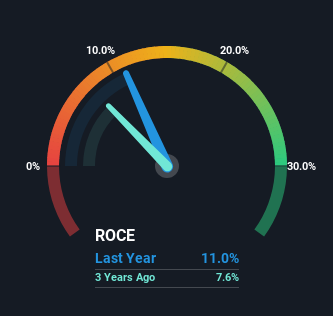- United States
- /
- Semiconductors
- /
- NasdaqGS:POWI
Slowing Rates Of Return At Power Integrations (NASDAQ:POWI) Leave Little Room For Excitement

Did you know there are some financial metrics that can provide clues of a potential multi-bagger? Firstly, we'll want to see a proven return on capital employed (ROCE) that is increasing, and secondly, an expanding base of capital employed. Put simply, these types of businesses are compounding machines, meaning they are continually reinvesting their earnings at ever-higher rates of return. So, when we ran our eye over Power Integrations' (NASDAQ:POWI) trend of ROCE, we liked what we saw.
What Is Return On Capital Employed (ROCE)?
If you haven't worked with ROCE before, it measures the 'return' (pre-tax profit) a company generates from capital employed in its business. The formula for this calculation on Power Integrations is:
Return on Capital Employed = Earnings Before Interest and Tax (EBIT) ÷ (Total Assets - Current Liabilities)
0.11 = US$88m ÷ (US$859m - US$65m) (Based on the trailing twelve months to June 2023).
Therefore, Power Integrations has an ROCE of 11%. That's a relatively normal return on capital, and it's around the 13% generated by the Semiconductor industry.
Check out our latest analysis for Power Integrations

In the above chart we have measured Power Integrations' prior ROCE against its prior performance, but the future is arguably more important. If you'd like to see what analysts are forecasting going forward, you should check out our free report for Power Integrations.
So How Is Power Integrations' ROCE Trending?
The trend of ROCE doesn't stand out much, but returns on a whole are decent. The company has employed 46% more capital in the last five years, and the returns on that capital have remained stable at 11%. Since 11% is a moderate ROCE though, it's good to see a business can continue to reinvest at these decent rates of return. Stable returns in this ballpark can be unexciting, but if they can be maintained over the long run, they often provide nice rewards to shareholders.
The Key Takeaway
The main thing to remember is that Power Integrations has proven its ability to continually reinvest at respectable rates of return. On top of that, the stock has rewarded shareholders with a remarkable 141% return to those who've held over the last five years. So while investors seem to be recognizing these promising trends, we still believe the stock deserves further research.
One more thing, we've spotted 2 warning signs facing Power Integrations that you might find interesting.
While Power Integrations isn't earning the highest return, check out this free list of companies that are earning high returns on equity with solid balance sheets.
If you're looking to trade Power Integrations, open an account with the lowest-cost platform trusted by professionals, Interactive Brokers.
With clients in over 200 countries and territories, and access to 160 markets, IBKR lets you trade stocks, options, futures, forex, bonds and funds from a single integrated account.
Enjoy no hidden fees, no account minimums, and FX conversion rates as low as 0.03%, far better than what most brokers offer.
Sponsored ContentNew: Manage All Your Stock Portfolios in One Place
We've created the ultimate portfolio companion for stock investors, and it's free.
• Connect an unlimited number of Portfolios and see your total in one currency
• Be alerted to new Warning Signs or Risks via email or mobile
• Track the Fair Value of your stocks
Have feedback on this article? Concerned about the content? Get in touch with us directly. Alternatively, email editorial-team (at) simplywallst.com.
This article by Simply Wall St is general in nature. We provide commentary based on historical data and analyst forecasts only using an unbiased methodology and our articles are not intended to be financial advice. It does not constitute a recommendation to buy or sell any stock, and does not take account of your objectives, or your financial situation. We aim to bring you long-term focused analysis driven by fundamental data. Note that our analysis may not factor in the latest price-sensitive company announcements or qualitative material. Simply Wall St has no position in any stocks mentioned.
About NasdaqGS:POWI
Power Integrations
Designs, develops, manufactures, and markets analog and mixed-signal integrated circuits (ICs), and other electronic components and circuitry used in high-voltage power conversion worldwide.
Flawless balance sheet with reasonable growth potential.


